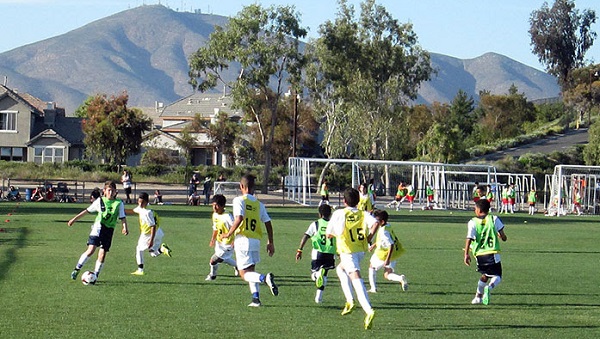Dougherty: Everything You Need to Be Prepared for Soccer Camp

 It’s hot. It’s humid. It’s soccer camp season.
It’s hot. It’s humid. It’s soccer camp season.
With the spring season over, youth players get a few weeks of rest before heading off for five or six days of resident soccer camp. These camps are a great opportunity to learn new skills, tactics, and to meet players from different areas and perhaps gain a long-lasting friendship or two.
If a player prepares for soccer camp properly, it can be a remarkably rewarding experience. But poor preparation can lead to a miserable week. Having attended my own share of camps as a youngster, and having coached at several quality camps as a coach, allow me to share insights I’ve gained over the years.
+READ – Dougherty: High school coaches, don’t forget to write a Thank You card
What to bring:
- Sun screen. As a full-blooded Irishman, I have to put this item at the very top. Spending six to eight hours in the hot sun will toast anyone’s skin, and sun screen is an absolute must. As a coach, I always looked out for the ginger-headed, freckle-faced players who loved playing shirtless. I would hand them my blue SPF 50 bottle and demand they coat themselves, whether they wanted it or not (usually not). Lather up, kids. Your mom and dermatologist will thank you.
- Vaseline and aloe. Vaseline to put on your toes and heels each morning to avoid blisters, and aloe since you’re likely to ignore my recommendation to lather up with sun screen.
- Flip flops. You need to wear flip flops walking to and from the bathroom and shower. Need a good reason? Look up “plantar warts.” Ugh.
- The right clothing. Each year there’s always that one kid who wears the same shirt, shoes and socks the entire week because he packed his clothes in a trash bag at the last second. Don’t be that kid. You’ll need for EACH DAY: two shirts, two pairs of socks, one pair of shorts, your “flats” to walk to and from the field and, as my mom would have said, two pairs of “unmentionables” (read: underwear). Not only is wearing the same clothes over and over simply disgusting for your roommate and friends at meals, it’s unhealthy. Need a good reason? Look up “chafing.”
- Toiletries. Nothing surprising here – bed sheets, pillow case, towel, and a small bucket to carry your toothbrush, toothpaste, liquid soap and wash cloth.
- A water bottle and a 12-pack of water for the dorm room. Keep the bottle in your soccer bag so you don’t lose it. If there was a black market for expensive water bottles left at camp soccer fields, coaches would bank a mint. Fill up the bottle before you head to the field. And consume plenty of water at night from your personal stash in your room. Staying hydrated throughout the week is critical to having a good soccer experience.
- A small fan.
- Cash for late-night snacks. And if your camp offers a “Camp Bank,” take advantage of it so you don’t have to carry around the cash or leave it in the room.
- A mentality to learn. You will have an opportunity to learn new skills and tactics that can fundamentally change the way you play the game. If you pay attention, that is. When it’s time to goof off, then goof off. But when the teaching is underway, focus and learn. If you chose your soccer camp well, you will be learning from experienced coaches and players who are passing along their knowledge of the game. Watch what the coaches are doing, listen to what they are saying, and absorb as much as you can.
+READ – Dougherty: Bringing the Playground to Game Day
What not to bring:
- Video games. Are you kidding me? Leave that stuff at home. Trust me, you’ll survive the experience, and for your hard-core gamers, you may actually learn how to talk to a human being again. Skip the electronics, and focus on soccer.
- Television. See above.
- A fresh haircut. Unless you like a fried scalp, that is. Save the haircut for after camp. (Unless you have a “boy bun.” That thing you can cut off immediately).
- A pound of bacon on your plate at breakfast, and any sort of ice cream at lunch or dinner. If you want to eat the fun stuff, save it for snacks at night. The last thing you want is to gulp down a double-scoop bowl of ice cream then run in the sun for two hours. It isn’t pretty.
- A poor attitude and unwillingness to learn.
By the end of the week, you’ll be tired, more tan, and a smarter and better soccer player. Now it’s your responsibility to share what you’ve learned with your club teammates. Apply at practice what you learned at camp. Work on the skills you acquired on your own, and build on the fitness level you gained from the week. Learned a new one-on-one fake? Practice it, often. Your camp team was named after an MLS, NWSL or World Cup team? Research that team, study how the team plays, and expand your knowledge of professional soccer.
+READ – Boehm: Mastroeni, Arena & American soccer’s cult of coaching insecurity
Then share your knowledge with your club teammates to help make them better. Talk to your club coach about some of the games you played at camp and how your team may be able to benefit from playing it as well. Don’t let the effort you invested and the knowledge you gained fade away.
Finally, there’s always one kid at every camp who gets picked on when the coaching staff isn’t around. Watch that kid’s back. Don’t be the bully; be the one who the bully sees and, as a result of your courage, chooses instead to go back to his video game.
Watching that kid’s back may not improve your soccer game, but it will do one better – strengthen your character. And that will give you a camp experience you’ll never forget.
SOCCERWIRE MARKETPLACE
- Start the Season Strong at Loudoun Premier Cup!
- 50th Annual Rael Vodicka Memorial Tournament
- Soccer Marketing Internships at The St. James FC
- Job Opening: The St. James FC Goalkeeper Academy Coach
- Full-Time Director of Goalkeeping for The St. James FC
- visitRaleigh.com Showcase Series 2025, hosted by NCFC Youth
- Join Official Elite Summer Soccer Camps with Europe’s Top Pro Clubs!
- OFFICIAL BAYERN MUNICH SUMMER CAMPS U.S.
- OFFICIAL FC BARCELONA CAMPS U.S.
- The Cup San Diego - Hosted by Legends FC












